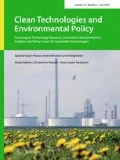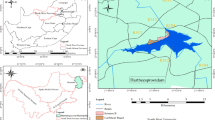Abstract
Environmental education in Malaysia is not a specific subject in the school curriculum. Rather, its general principles are dispersed across the whole of the curriculum. Consequently, teachers without adequate awareness regarding environmental issues may not make an effort to educate students on the importance of preservation and conservation of the environment, and may refrain from inculcating sustainable practices. The Iskandar Malaysia (IM) Ecolife Challenge is an initiative taken under a low-carbon policy. Its ambitions are twofold: first, to educate both students and teachers on low-carbon issues, and second, to impart the tools with which a low-carbon society may be developed in the IM region. The program took place in 2014, over a period of 1 month, with 80 primary schools participating across IM. The activities covered recycling, saving water and saving electricity, as well as the completion of a workbook designed to raise consciousness of local and global environmental concerns. A survey conducted before and after the program, with 5641 (36.1 %) of 15,623 primary sixth grade students (12 year olds) who had participated in the program, showed that their low-carbon practices had increased by 8 %, while their teachers’ awareness had increased by 5 %. The survey also showed that the total weight of recycling items collected during the period of intervention was 45,540 kg, while a total of 90,857 kWh of electricity and 767.85 m3 of water were saved by the schools. If such an initiative was to be implemented across all 228 primary schools in the IM region, the implications are considerable: a total of 322 kt CO2 could potentially be reduced in 1 month, which would help to achieve a low-carbon society.


Similar content being viewed by others
References
Bouzeineddine SF (2012) The integration and the impact of environmental education in school curriculum. Masters Dissertation, Lebanese American University
Chapman D, Sharma K (2001) Environmental attitudes and behaviour of primary and secondary students in Asian cities: an overview strategy for implementing an eco-school program. Environmentalist 21:265–272
Daniel EGS, Nadeson T, Abd Ghani MS (2006) Organising for action in environmental education through smart partnerships: a malaysia experience. In International Conference for the Environment, Zimbabwe, April 2006
Haron SA, Paim L, Yahya N (2005) Towards sustainable consumption: an examination of environmental knowledge among Malaysians. Int J Consum Stud 29(5):426–436
Hossain FM, Hasanuzzaman M, Rahim NA, Ping HW (2015) Impact of renewable energy on rural electrification in Malaysia: a review. Clean Technol Environ Policy 17:859–871
Jeronen E, Jeronen J, Raustia H (2009) Environmental education in Finland—a case study of environmental education in nature schools. Int J Environ Sci Edu 4(1):1–23
KeTTHA (2011) Low carbon cities framework and assessment system. KeTTHA, Putrajaya
KIKO Network (2012) FY2012 Kyoto city: overview of the children’s eco-life challenge project. KIKO Network, Kyoto
McBeth W, Volk TL (2010) The National Environmental Literacy Project: a baseline study of middle grade students in the United States. J Environ Educ 41(1):55–67
Meerah TSM, Halim L, Nadeson T (2010) Environmental citizenship: what level of knowledge, attitude, skill and participation the students own? Proced Soc Behav Sci 2:5715–5719
Mekhilef S, Saidur R, Said SM, Hong PH, Islam MR (2014) Techno-economic evaluation of energy efficiency measures in high rise residential buildings in Malaysia. Clean Technol Environ Policy 16:23–35
Nadeson T, Rasid NSA (2005) The implementation of EE in Malaysian schools: an NGOs overview. Best of both worlds conference 2010: effective environmental education for biodiversity conservation, Kuching, 8–9 November 2005
National Economic Advisory Council (2010) New economic model for Malaysia: concluding part—strategic policy measures. Percetakan Nasional Malaysia Berhad, Malaysia
Palmer N, Neal J (2003) The handbook of environmental education. Taylor and Francis, Abingdon
Phang FA, Wong WY, Ho CS, Jusoh F, Ishak H, Anuar MA, Safri IE (2014a) Iskandar Malaysia Ecolife Challenge 2013: modul alam sekitar melalui mata pelajaran sains darjah enam. Bul PPSMJ 24:13–18
Phang FA, Wong WY, Suda M, Ho CS, Fujino J (2014b) Iskandar Malaysia Eco-Life Challenge promotes low carbon awareness among primary school students. 25th Japan society of environmental education (JSEE) Annual Conference on at Hosei University, Tokyo, 2–3 August 2014
Phang FA, Wong WY, Ho CS, Musa AN, Suda M, Safri IE, Fujino J (2016) Low carbon awareness among primary school students through Iskandar Malaysia Ecolife Challenge competition. Man India 96(1):387–395
Said AM, Ahmadun FR, Paim LH, Masud J (2003) Environmental concerns, knowledge and practices gap among Malaysian teachers. Int J Sustain High Educ 4(4):305–313
Shah A, Jehangir S (2007) Teaching for quality education in environmental education: challenges and possibilities. In: Pakistan Ali S, Rizvi M (eds) Quality in education: teaching and leadership in challenging times, Vol 2. Aga Khan University, Institute for Educational Development, Karachi, pp 565–579
Solangi KH, Saidur R, Luhur MR, Aman MM, Badarudin A, Kazi SN, Lwin TNW, Rahin NA, Islam MR (2015) Social acceptance of solar energy in Malaysia: users’ perspectives. Clean Technol Environ Policy 17:1975–1986
UNESCO-UNEP (1978) Intergovermental Conference on Environmental Education, Tbilisi, USSR, Final Report. Paris, UNESCO
Utaka F, Gomi K, Taura K, Naito M, Wakabayashi M, Fukuda T, Morioka T, Ura T, Ochi Y, Matsuoka Y (2009) A roadmap towards low carbon kyoto. http://2050.nies.go.jp/report/file/lcs_japanlocal/kyotolcs.pdf. Accessed 2 Apr 2015
UTM-Low Carbon Asia Research Centre (2012) A roadmap towards low carbon Iskandar Malaysia 2025. UTM-Low Carbon Asia Research Centre, Malaysia
UTM-Low Carbon Asia Research Centre (2014) Low carbon society blueprint for Iskandar Malaysia 2025 with 10 implementation plans, 3rd edn. UTM-Low Carbon Asia Research Centre, Malaysia
Wong WY, Phang FA (2011) Level of awareness on low carbon society concept among secondary school students. Prosiding EDUPRES 2011, UTM Johor, Malaysia, pp 41–55
Zakaria MFB, Phang FA (2016) The effectiveness of inculcating education for sustainable development (ESD) in physics learning module. Man India 96(1):325–335
Acknowledgments
This research was sponsored by the Ministry of Education Malaysia under the Grant R.J130000.7301.4B145 and SATREPS project funded by JICA and MOHE. The authors would like to acknowledge prize sponsors and researchers in the following organizations: SATREPS, JICA, JST, KPM, UTM, Kyoto University, KIKO Network, IRDA, JPNJ, NIES and Okayama University.
Author information
Authors and Affiliations
Corresponding author
Rights and permissions
About this article
Cite this article
Phang, F.A., Wong, W.Y., Ho, C.S. et al. Iskandar Malaysia Ecolife Challenge: low-carbon education for teachers and students. Clean Techn Environ Policy 18, 2525–2532 (2016). https://doi.org/10.1007/s10098-016-1215-y
Received:
Accepted:
Published:
Issue Date:
DOI: https://doi.org/10.1007/s10098-016-1215-y




